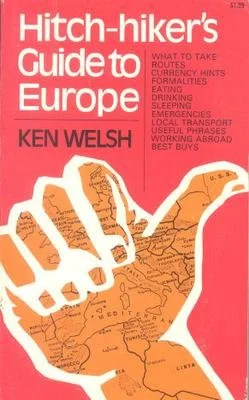If you wanted to travel cheap in Europe in the 1970s, your bible was The Hitch-Hiker's Guide to Europe by Australian expatriate Ken Welsh, first published in 1971. It contained advice on hitching technique and etiquette, where to sleep and eat cheap, and what to expect when you came to a national border.
Twenty years before most European Union countries abolished passport and border controls under the Schengen Agreement, travelers faced a confusing set of national regulations. The countries of the communist Eastern Bloc were particularly tricky, requiring visas and sometimes a “service fee” to the mean-looking uniformed guy with the Kalashnikov who was standing in front of your vehicle.
None, however, was trickier than Albania. In the 1972 edition of The Hitch-Hiker's Guide, the entire contents of the subsection on Albania consisted of just two words. "Forget it."
Since the communist regime came to power at the end of World War II, Albania had been, to all intents and purposes, a closed country. Except for politicians, diplomats, and sports teams, few were allowed to leave. Anyone caught trying to skip across the border to Yugoslavia or Greece was likely to be shot or, if arrested, sent to a labor camp where they might die of starvation or disease. To maintain socialist purity, Albania did not welcome foreign visitors, except a few on supervised tours.
Albania had refused to join the other republics of the western Balkans in the Yugoslav Federation which, under the leadership of Marshal Tito, had broken from Stalin and adopted its own kinder, gentler version of communism.
Albania became a satellite of the Soviet Union, dependent on aid from Moscow and with Soviet army, naval and air force bases around the country. Relations began to deteriorate after Joseph Stalin’s death in 1953, with Albania’s authoritarian leader, Enver Hoxha, accusing Stalin’s successor, Nikita Khrushchev, of abandoning the true principles of Marxist-Leninism.
Where could this small country turn to after breaking with the Soviet Union? There was only one place to go—to the great communist rival, the China of Mao Tse-Tung.
As Eri Xhikola, my guide on a walking tour of the capital, Tirana, put it: “We took the worst of Stalinism, combined it with the worst of the Cultural Revolution and created a real mess.”
If Hoxha and his secret police, the Sigurimi, were worried about foreign agents and influences in the Stalin-Khrushchev era, their paranoia increased as they implemented their own version of the cultural revolution, sending professionals to the countryside to work on collective farms and bringing uneducated farmers to the cities. The result—economic stagnation and rampant corruption.
Of course, you don’t know you’re poor unless you see people who look like you who are living better than you do. That’s why the myth of the socialist paradise was maintained through the control of information and restrictions on foreigners entering the country for fear they talked about what they earned and owned.
The Sigurimi closely monitored the movements and contacts of the small cadre of foreign diplomats in Tirana, following them in unmarked cars, bugging their apartments and enlisting their local staff as informers. They placed agents as receptionists at the only two hotels in the city where foreigners were allowed to stay. Rooms assigned to foreigners were under 24-hour surveillance, with hidden microphones connected through a switchboard and patched in directly to Sigurimi headquarters.
“The People’s Republic of Albania,” Hoxha once declared, “is closed to enemies, spies, hippie tourists and other vagabonds.”
To maintain what it called “socialist aesthetics” and to make some foreign exchange, the government maintained barber shops and clothing stores at all border crossings. Foreigners were informed that “if they choose to be adjusted—to cut their hair, to dress normally,” they could enter. No doubt some refused and turned back, probably echoing the Hitch-Hiker’s Guide advice, “Forget it.”
One of the minor consequences of the restrictive policy is a dearth of travel literature on Albania in this period. A few glimpses of what it was like to travel there came in letters in response to a travel feature in The Guardian. One reader recalled:
“Progressive Tours organized package holidays to Albania in 1972—we remember that company because we joked about the holiday getting progressively worse the longer it lasted. No personal exploring was allowed … Organised trips were to communal farms and the Ho Chi Minh cotton factory, ignoring the hilltop castles and archaeological sites we passed.”
Today, a half century later, Albania welcomes tourists. According to tour guide Eri, about three million visited the country in 2019, the last year before the COVID epidemic. “We expect six million in 2023,” he said. I said I was happy to be one of them.

